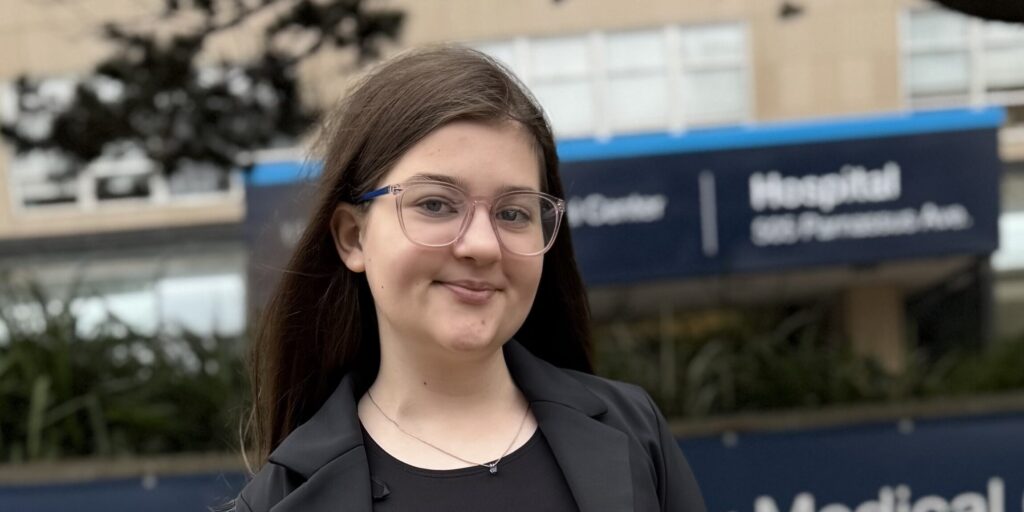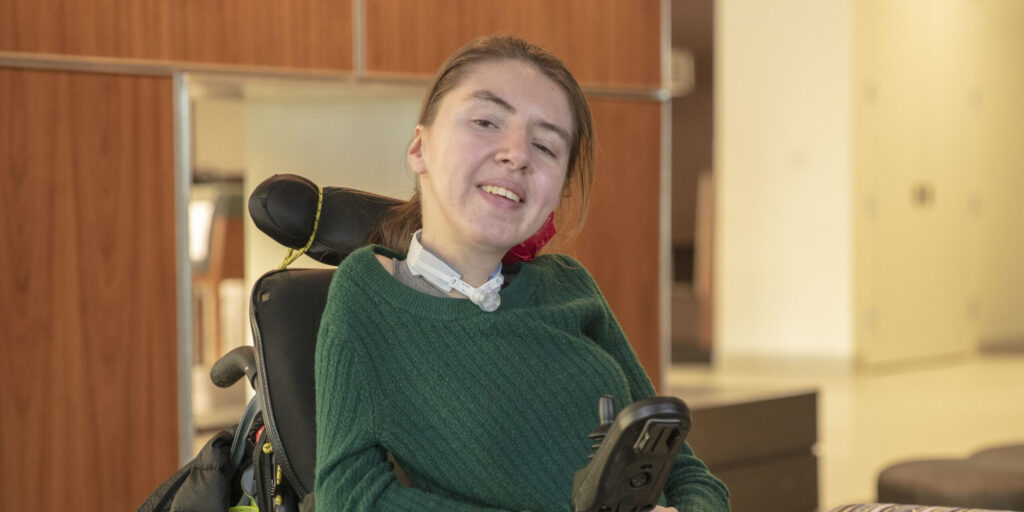
International Day of Women and Girls in Science: MDA’s Spotlight on Katie Frayer
By Rebecca Hume | Thursday, February 9, 2023
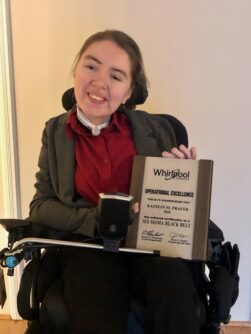
Katie Frayer, Engineering Analyst at Whirlpool Corporation
International Day of Women and Girls in Science, February 11, endeavors to acknowledge and celebrate the invaluable role that women and girls play in accelerating change and discovery in the professional realm of science, technology, engineering, and math (STEM). In recognition of International Day of Women and Girls in Science, the Muscular Dystrophy Association (MDA) is honored and excited to highlight the career and accomplishments of Katie Frayer.
As an Engineering Analyst at Whirlpool Corporation, Katie applies her passion, expertise, and innovative design ideas to the product development process. She recently started a new role as an engineer on the Laundry Aesthetics Team. In this role, she works specifically on developing and designing doors, top panels, and front panels for Whirlpool washers and dryers. Katie guides products through development from concept through lab testing, production, and onto the sales floor. She shares that one of the most rewarding aspects of her career is seeing her projects become products in homes across the globe.
After earning her undergraduate degree at Michigan State University, Katelin completed the Whirlpool Engineering Rotational Leadership Development (WERLD) Program. This program allowed her to gain multifaceted experience within the company and as an engineer in general. During the program, she earned her OpEx Six Sigma Black Belt, which designates a prestigious level of operational excellence in her field, and completed her Master’s of Science in Mechanical Engineering at Purdue University. The 25-year-old also lives with Arthrogryposis Multiplex Congenita (AMC) and recently served as a panelist for an MDA STEM program discussion about people living with neuromuscular disease who are in STEM careers.
Katelin shares her journey, experience, insight, and advice – both about being a woman in the field of science and about pursuing a career in STEM as a person living with a disability.
When did you become interested in engineering?
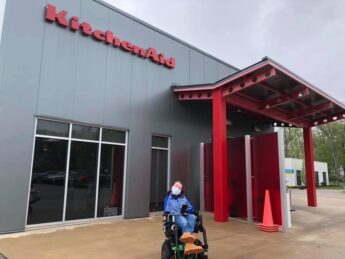
Katie outside of KitchenAid.
I became interested in engineering at a very young age, mostly because I wanted to help make life better for people with disabilities. There was a brief time when I wanted to be a doctor, but that desire quickly dissipated after my first surgery. As I got older, fixing the world to be accessible for myself was no longer satisfying, and I felt the need to be able to improve accessibility for others, as well. Engineering was just very natural for me, because I had been doing it my whole life. Almost everything I did required some sort of accommodation, which wired me to be a problem solver. I always thought that I would design better wheelchairs, but during an internship with the Whirlpool Corporation Sustainability Team, I gained a new perspective on what accessibility could look like. I realized that I could work on wheelchairs that insurance may or may not cover, or I could make the world more accessible. The idea that I could transform independent living through appliances pulled me in!
Were there people along the way who were role models that motivated or encouraged you to go into this field?
I have been extremely fortunate to always have the support of my family and friends, as well as some incredible mentors. My parents taught me to never give up, my sister taught me to love to learn, and my friends made sure I could always capitalize on the opportunities ahead of me. My mentors taught me to dream big and get things done. Some people say it takes a village, but I needed most of the Midwest. Did I have a role model that had a disability? Unfortunately, no, but honestly, I think that motivated me, as well.
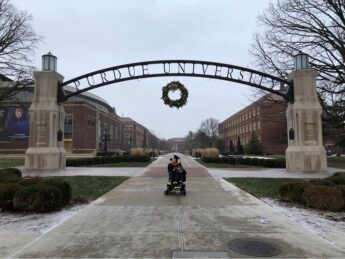
Katie at Purdue University.
As an individual living with a disability, did you hit any barriers when pursuing your education or career goals? Did you require any accommodations?
I had a bumpy road to get where I am. There were physical barriers, like stairs to classrooms, but more than that, there were social barriers. It is easy to get around the physical barriers, for the most part. There are wonderful teams of people to help make things accessible, but people are harder to change. Ultimately, I have been able to overcome the barriers, though it has never been easy. At one point, I even had an educator tell me that I was an inspiration for trying, but I would never be an engineer. Obviously, we see how that turned out, but that should never be something a student should be told. Hopefully, that is something that will change with time. As there are more of us entering the field, there will be less of a need for us to prove ourselves. In the meantime, it is important to remember that the best things in life are rarely easy; it just means we are accelerating change.
During my time at Whirlpool Corporation, I have been pleasantly shocked by the lack of barriers. Sure, there have been some accommodations that I have needed, but I have felt incredibly valued from the moment I arrived. For the first time in my life, I am somewhere that people see what I can do, before what I cannot. They swiftly go above and beyond whether it is redoing a bathroom, even though there is already an ADA compliant bathroom that does not meet my needs or reaching out to make sure they know how to best help me in case of an evacuation. Every day I am at Whirlpool, I know I am finally where I am meant to be.
Have you had the opportunity to use your experiences and perspective as a person living with a disability to impact product design to make products that are more accessible?
Accessibility is a journey, and I have been excited to be a part of the journey here at Whirlpool Corporation. We are starting by building a strong foundation and culture of accessibility internally. My perspective is inherently a part of my work, regardless of the projects that I am assigned. I have been able to start and take part in some really impactful conversations as a part of the Awareness of Visible and Invisible Disabilities (AVID) Employee Resource Group, which relies on representation to advocate and promote a more equitable workplace. The future is bright, and the accessible world that some of us dream of is becoming more attainable!
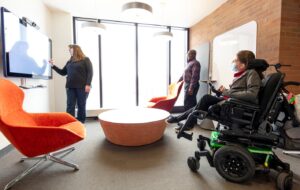
Katie at Whirlpool.
You are also passionate about advocating for more inclusion of people with disabilities and are involved in efforts to increase inclusion in employment. What has your experience been like and what advice would you give to others living with a disability who want to pursue higher education and employment in STEM?
I am a firm believer that innovation is a by-product of personal experience. Therefore, I believe we need to bring all the voices to the table. I have been truly lucky and blessed to have made it to where I am. I have had an incredible support system that has been there when I needed it most, and so I feel a deep need to help others make it as well.
The greatest piece of advice I can offer is to know your value. There will inevitably be times when those around you will doubt you, disregard you, or blatantly tell you that your dreams are not possible. It truly does not matter what they say, as long as you maintain your confidence and resolve. Eventually, you will find a space like Whirlpool is for me: your place where others see your value, and then you can thrive.
There is also a historical disparity of women in STEM careers. Why do you think women make great STEM professionals?
Women belong everywhere. It is as simple as that. Every person brings a unique perspective to the table, and we need them. We need the diversity of thought, creativity, and life experiences to drive innovation. We need the conversation starters. We all have potential, and to think that our gender detracts from that puts progress at a disadvantage. It will take everyone to build the world we want to see in the future.
What advice would you give young women who are considering a career in STEM?
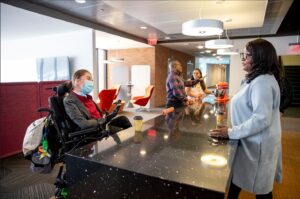
Katie with colleagues at Whirlpool.
My advice to young women considering STEM careers is to take ownership of your future. Everyday is filled with choices and challenges, and despite what the world says, everyone gets to make their own choices. Own your choices. Drive your success. There will always be times when you make mistakes, but learn from them and don’t regret them. If you make your own way in STEM, then no one can take it away from you.
MDA thanks Katie for sharing her wisdom and experience as she paves the way for other women and individuals living with disabilities in STEM careers. Her hard work and success as she continues to grow and excel in her field serves as a reminder to our community that you can – and should – pursue your dreams.
Disclaimer: No content on this site should ever be used as a substitute for direct medical advice from your doctor or other qualified clinician.



